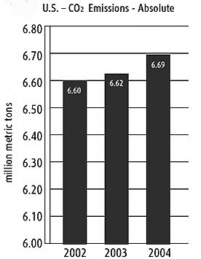|
||||
|
|
|
|||
| Home | Subscribe | Back Issues | The Organization | Volunteer | Do Something | ||||
|
||||
|
Bush Fiddles While the World BurnsAs global warming sets new and dangerous records, the US sets new records in pollutionby Don Monkerud Scientists tell us that no weather effect can be blamed on a single cause because the earth's weather system is so complex, yet rising greenhouse gases and temperatures are breaking records. While not directly attributed to the current powers in Washington DC, the new weather records point out serious consequences resulting from inattention, a failure to provide leadership, and outright hostility toward curbing the nation's contribution to global warming. In April 2006, studies revealed that the US was not only still the biggest polluter in 2004, but also that the US emitted more greenhouse gases-the major cause of global warming-than at any time in history. (See http://news.mongabay.com/2006/0419-greenhouse.html ) In 2005, NASA reported the hottest year ever, probably hotter than any time in the past 650,000 years. Global warming is considered irreversible at this point and weather forecasts predict increasingly hotter and dryer conditions, although climate change also will bring turbulent patterns such as flooding, drought and hurricanes. This spring Maine, Massachusetts and New Hampshire experienced the worst flooding in 70 years along the Merrimack, Spicket, and Shawsheen Rivers. Eight of New Hampshire's ten counties were declared disaster areas, 600 roads were closed, and tons of sewage were washed into rivers. European flooding also set records. In April 2006, the Danube rose to its highest level in 111 years, pushing people from their homes and flooding more than 12,000 acres of farmland. These floods come on the heels of devastating floods in 2005 when heavy rains caused flooding in Yemen, Colombia, Eastern Europe, northeastern Australia, Indonesia, and northern Argentina. In 2005, a dramatic rise in coastal water temperatures of up to seven degrees led to the deaths of birds and fish from Central California to British Columbia. Populations of seabirds and fish, such as salmon and rockfish, fell to record lows. Similar die-offs of birds and fish occurred in Europe's North Sea, caused by warmer water and the disappearance of plankton. (See www.cnn.com/2005/TECH/science/08/02/ocean.crisis.ap/index.html)

Coral death set a record in May 2006, when the first coral reefs were listed as threatened under the Endangered Species Act. Elkhorn and staghorn coral, the main reef-building species in the Caribbean and the Gulf of Mexico, declined 80 to 98 percent in the region, due to higher water temperatures. Coral death was virtually unknown 25 years ago, but today dead coral is showing up as dead white rubble around the world. Forest fires set records in March 2006, when 1.8 million acres burned in Colorado, Oklahoma and Texas, the most at any time since record keeping began. The Southwest and the central and southern Plains are expecting a worse-than-usual fire season in 2006, compounded by a lack of water in Colorado, which had below average snow packs eight of the past nine seasons. Climate researchers at Perdue and MIT find evidence that global warming increases hurricane activity. The 2005 hurricane season broke many records. Katrina was the deadliest hurricane in the US since 1928, and the costliest ($80 billion) natural disaster ever to hit the US. Other records were set: the most hurricanes (15); the largest number of hurricanes hitting the US (4); the most powerful storm ever recorded; and the most Category 5 hurricanes (4). In June 2001, the National Academy of Sciences reported, "Greenhouse gases are accumulating in the earth's atmosphere as a result of human activities, causing surface air temperatures and subsurface ocean temperatures to rise." Bush responded to the report by reducing enforcement of pollution rules for US industry and energy companies in favor of a voluntarily curb on carbon dioxide emissions. Repeatedly Bush and the Republican Congress have failed to increase conservation and adequately develop alternative energy, refused to cooperate with other countries, and rejected offers to curb greenhouse gases. By doing so, they encourage industry to take a jocular attitude toward global warming. Americans don't agree. In March 2006, a TIME magazine/ABC News/Stanford University poll revealed that 88 percent believe global warming threatens future generations and 38 percent view global warming as a serious problem. Two-thirds believe that the government should do more to address global warming. Sixty percent want the government to lower power plant emissions, and 87 percent support tax breaks to develop alternative energy sources. Threats from "terrorism" pale when compared to the destruction and dislocation from global warming. While it may be irreversible, current policies only hasten the effects and make them worse. A radical change is needed: it's time to stop being manipulated by fear of terrorism and nationalistic slogans. Before people take to the streets burning SUVs and Hummers, we could at least vote out every legislator with a poor voting record on the environment.¥ |
|
